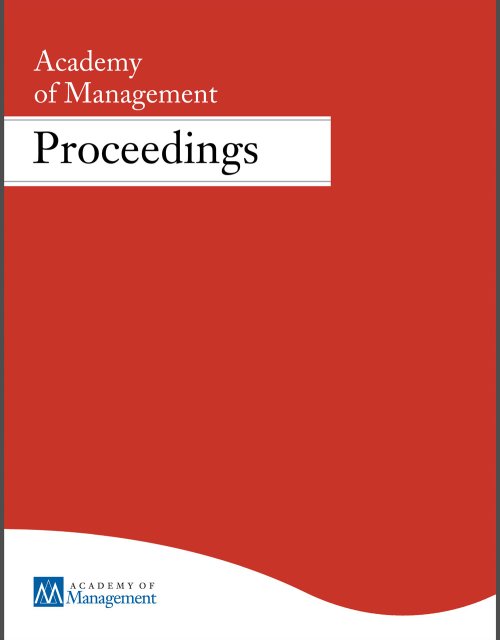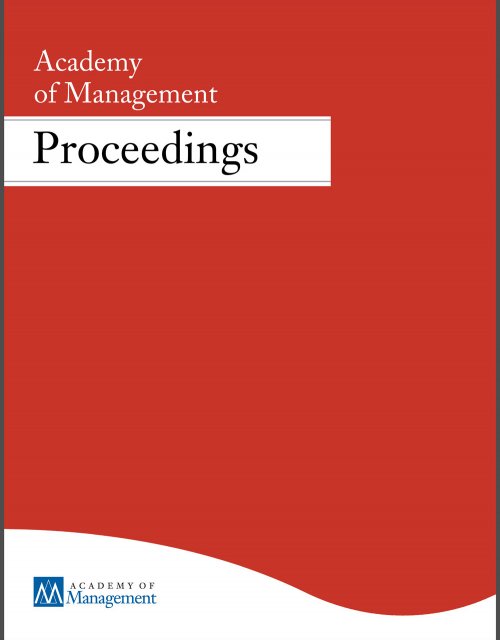Publication records
Subject(s)
Economics, politics and business environment
Keyword(s)
digital identity, e-government, digital transformation
Subject(s)
Human resources management/organizational behavior
While decades of research have demonstrated that networks, through their structural configurations, powerfully influence people’s behaviors, attitudes, and outcomes, recent work has sought to better understand the role of individuals in shaping network processes. There are increasing appeals to devote greater attention to the differences individuals exhibit in establishing, managing, and navigating social relations. Accumulated evidence underlines that 1) individuals may be able to actively position themselves in the network and that 2) agency and purposive action may look different for certain individuals despite occupying similar network positions. In response to these emerging discussions, our symposium aims to contribute to a better understanding of individual agency in network theory. Questions include: What role do individuals play in shaping the process of network evolution? And, how do these dynamics impact the distribution of social capital (positive or negative) among actors within networks? This line of work provides a promising starting point for network agency research. Our presenters’ research highlights that a productive conceptualization of individual agency within organizational networks should be multifaceted. People might strategically leverage social relations and network relations for their own sake without meaningfully changing the structure of their networks. They can also take actions that meaningfully shape the architecture of their networks, intentionally or otherwise. During the processes of individuals exerting agency in shaping their social relations and exploiting network-related advantages, numerous potential mechanisms exist and should be systematically elaborated.
With permission of the Academy of Management
Volume
2024
ISSN (Online)
2151-6561
ISSN (Print)
0065-0668
Subject(s)
Technology, R&D management
Keyword(s)
augmentation, automation, task routinization, human capital, crowd science, algorithmic management
Artificial intelligence (AI) is diffusing rapidly throughout the economy, raising questions regarding its impact on human workers. Current theories predict that the degree to which humans are replaced (automation) or supported (augmentation) will depend on characteristics of the task such as its degree of routinization and manual vs. cognitive nature. Yet, existing empirical evidence tends to come from aggregate occupation data or individual case studies, with limited research using larger samples of projects or tasks. Moreover, whether and how AI is implemented may not only depend on task characteristics but also on managers’ objectives, which may go beyond narrow efficiency to include benefits resulting from human employment itself (“employment goals”). We provide novel empirical evidence using data from more than 1,200 research projects that involve crowd members in different tasks such as data collection, data analysis, or creative problem solving. We confirm that the use of AI is associated with task characteristics, although the patterns are more nuanced than those shown in work on prior automation technologies such as computers and robots. Moreover, we find that managers pursuing employment goals are less likely to use AI for automation, while they are just as likely as others to use AI to augment the work of human workers. We contribute to the literature on AI adoption in organizations by providing rare evidence from project-level data, and by highlighting that the path towards “good AI” or “bad AI” is, partly, a matter of human choice.
With permission of the Academy of Management
Volume
2024
ISSN (Online)
2151-6561
ISSN (Print)
0065-0668
Subject(s)
Technology, R&D management
Keyword(s)
research questions, experiential knowledge, crowd science
Recently, organizations started exploring the use of crowdsourcing not only to solve pre-defined problems, but also to identify novel problems worth solving – not least in the hopes of more effectively aligning research and innovation agendas with issues of societal relevance. Yet, a key challenge is that many crowd-identified problem statements are not novel and simply re-state well-known problems, resulting in an ineffective way to organize problem identification. In this study, we theorize that the extent of “user knowledge” among crowd members, which can be acquired both through one's own experience as someone affected by a particular situation (e.g., as a patient) and through engagement with the experiences of others (e.g., as a caretaker or medical professional), increases the novelty of problem statements. In addition, we explore whether the novelty of crowd-identified problem statements might be improved by providing crowd members with two types of complementary knowledge related to the problem space: declarative and procedural. Our preliminary results from a large-scale online experiment show a significant positive relationship between “user knowledge” of crowd members and the novelty of the problem statements they submit. Providing crowd members with complementary knowledge related to the problem space does not lead to significant novelty improvements, according to our preliminary analysis. Nevertheless, these initial findings indicate that the impact of experiential knowledge in problem-solving also applies to problem finding. This has significant implications for organizations aiming to effectively utilize crowdsourcing for establishing their research and innovation agendas.
With permission of the Academy of Management
Volume
2024
ISSN (Online)
2151-6561
ISSN (Print)
0065-0668
Subject(s)
Technology, R&D management
Keyword(s)
augmentation, automation, task routinization, human capital, crowd science
In this symposium, we will examine a wide array of questions and hypotheses that focus on the people who conduct science -- as a complement to more established research traditions that focus on the publications and patents that people produce. Talks will cover topics that relate to a variety of career stages and background characteristics such as: What are the characteristics of scientists who are also inventors? How is Artificial Intelligence being integrated into crowd science projects? How does media coverage about research variably impact the authors of the research? Talks will also feature innovative data resources including one presentation that is able to examine the ways in which External Letters variably influence academic careers with respect to tenure and promotion decisions (particularly in relation to faculty who seek and gain one or more patents).
With permission of the Academy of Management
Volume
2024
ISSN (Online)
2151-6561
ISSN (Print)
0065-0668
Subject(s)
Diversity and inclusion; Human resources management/organizational behavior
Keyword(s)
Diversity, equity and inclusion, DEI, global workforce, pandemic, employee well-being, corporate value, women
The pandemic has not wholly derailed DEI as much as feared. The insights from the DEI officers of globally active companies demonstrate optimism and inspiration for those designing DEI strategies in 2022.
ISSN (Print)
0015-6914
Subject(s)
Diversity and inclusion; Ethics and social responsibility
Keyword(s)
Course design and delivery, Women in higher education, Feature article, Europe
JEL Code(s)
124
Subject(s)
Diversity and inclusion; Health and environment; Technology, R&D management
Keyword(s)
open Innovation in Science (OIS), open science, citizen science, crowd science, crowd paradigms
Volume
9
Journal Pages
1–12
ISSN (Online)
2057-4991
Subject(s)
Human resources management/organizational behavior
Keyword(s)
leadership, leadership transitions, career transitions
ISSN (Print)
0015-6914
Subject(s)
Diversity and inclusion
Keyword(s)
workplace visibility, career development, self-promotion, emotional barriers, societal norms, professional growth, networking strategies, gender expectations, personal branding, collective responsibility, behavioral change, head heart and hands
ISSN (Print)
0015-6914

